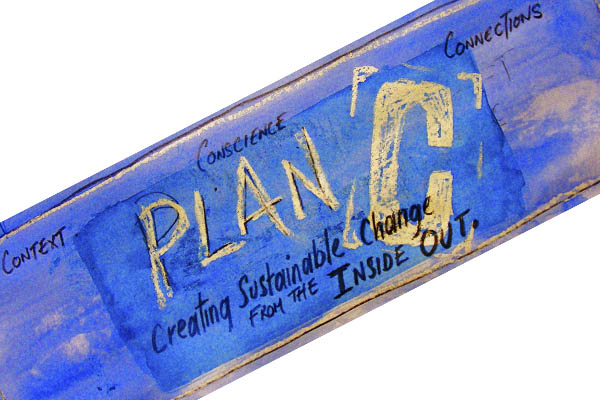Green. With Envy.

Climate scientist James Hansen once went on record to condemn the scientific reticence that stopped so many scientists from saying what they knew about the scale and speed of climate change.
This reticence, he said, muddied the debate and cost the world valuable time that could have been spent looking for solutions.
It’s not just the science of climate change that suffers from reticence. So does the psychology of change, which may be why, when there seems to be so much activity around climate change, so much undeniable evidence that we must change direction, so few are doing anything constructive.
Reports by groups like the American Psychological Association have looked at the psychological drivers of and reactions to climate change and why, even when faced with such overwhelming evidence of a need for change, we don’t. They say it’s anxiety and helplessness, rather than ambivalence or apathy, that are the biggest barriers to effective action.
But it’s not like we haven’t heard these words before. Anxiety, helplessness powerlessness – words that just wash over us these days, barely sticking long enough to make an impact.
Let’s pick a new word: envy.
Acknowledging the psychology of climate change, of how we got here in the first place would seem crucial, but so often this is dismissed as a bit too ‘touchy feely’ – not practical when there is so much ‘real’ work to be done in the ‘real world.’
And yet everything you need to know about our inability to act is summed up in this word.
Envy is like gravity – a powerful force that affects everything it touches. It arises when a person feels they lack what the other has and either longs to possess it or wishes that the other person did not possess it.
Most crimes are based on envy, our politics are based on envy, our economy and consumer culture is certainly is based on envy, indeed we have institutions called advertising agencies whose sole purpose is to stimulate and regulate envy amongst the population in order to stimulate growth.
Ironic, since envy is the one emotion most likely to stunt real growth over the longer term.
We envy our children too.
That’s a fact, though of course we deny the depth of what that means. Nevertheless, we envy them their future, their connection with nature, their creativity, their strength and vitality, and the possibility of global healing, dare I say ‘world peace’, that we have never grasped.
By doing nothing in the face of climate change we are in fact enacting a very malicious form of envy that has become an important driver of so much of the environmental devastation we face today.
Envy poisons the river, uses up the resources, privatises the commons, scars the landscape. It sucks emotional intelligence dry and dehumanises whatever it touches. Destruction of the natural world is envy directed at making sure our children can’t have what we can’t have – the future. Framed in this context, envy is a desire to be finished with this world before it is finished with us.
The drive from which envy springs is very human, but that doesn’t mean we have to give in to it, or worse ignore it.
In a very different world – the world that has to emerge and quickly – we would be staking a claim in the future through our children and acting not only to preserve the future, but to equip our children with the tools they need to thrive.
And, by the way, that doesn’t mean the latest iPhone apps.
It means leading by example, being parents instead of pals, teaching that our actions have consequences both intended and unintended, it means morphing our pride in ‘my son the lawyer’ into ‘my son the farmer’, insisting on schools that teach our children to think critically and divergently, to encourage environmental literacy and for God’s sake stop faffing around with debates about whether climate change and peak oil are real or not.
Yes, of course it is overwhelming, and given our envy-based society, it’s so easy to feel anxiety, helplessness and powerlessness – and then do nothing about it.
What’s harder to ‘get’ is that this pervasive sense of helplessness, depression and just plain exhaustion is a direct result of a life lived in envy. Envy doesn’t just suck the life out of the envied; it sucks the life out of the envier. It disconnects us from our humanity, makes authentic relationships with others nearly impossible and drives the sort of addictive behaviour that we find it hard to save ourselves, let alone our children, from.
Is it any wonder we don’t have the energy to fix the world?
The bottom line is: you can’t be green with envy. The level of self awareness required to be ‘green’ is completely incompatible with a life lived in envy. And although people who feel empty in themselves often find it difficult to be generous, the more we give of ourselves, the more the world returns to us.
Acknowledging our responsibility to the future also frees up amazing reserves of energy that we can invest in a more meaningful now.
Let’s give our kids a break. Let’s give our communities, our economy and our planet a break. Let’s give it up envy for good.
Originally posted at Plan C.
© Pat Thomas 2009. No reproduction without the author’s permission.












